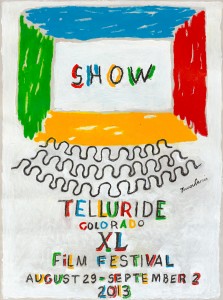By Ray Pride Pride@moviecitynews.com
TELLURIDE FILM FESTIVAL ANNOUNCES DEAN TAVOULARIS AS 40th ANNIVERSARY FESTIVAL POSTER ARTIST
FOR IMMEDIATE RELEASE
May 30, 2013
BERKELEY, CA – The 40th Telluride Film Festival (August 29 – September 2, 2013), presented by National Film Preserve LTD., proudly announces Oscar-winning production designer Dean Tavoularis as its 2013 poster artist. Tavoularis will attend the 40th Telluride Film Festival over Labor Day weekend to present his poster design to the public and hold a poster signing for festival guests.
 As a student, Dean Tavoularis studied painting and architecture at different art schools and went on to work at Disney Studios as an in-betweener in the animation department where he worked on the 1955 film “Lady and the Tramp.” He then transitioned to the live-action department where he worked on the 1954 film “20,000 Leagues Under The Sea.” His career as a production designer began in 1967 when filmmaker Arthur Penn asked him to lead the artistic direction for “Bonny And Clyde.” Three years later, he and Penn teamed up again on “Little Big Man.” He began working with Francis Ford Coppola in 1972 on “The Godfather”, which was the beginning of much collaboration including the latter two films in “The Godfather” trilogy and “Apocalypse Now.”
As a student, Dean Tavoularis studied painting and architecture at different art schools and went on to work at Disney Studios as an in-betweener in the animation department where he worked on the 1955 film “Lady and the Tramp.” He then transitioned to the live-action department where he worked on the 1954 film “20,000 Leagues Under The Sea.” His career as a production designer began in 1967 when filmmaker Arthur Penn asked him to lead the artistic direction for “Bonny And Clyde.” Three years later, he and Penn teamed up again on “Little Big Man.” He began working with Francis Ford Coppola in 1972 on “The Godfather”, which was the beginning of much collaboration including the latter two films in “The Godfather” trilogy and “Apocalypse Now.”
Tavoularis has spent the last ten years focusing on his work as a painter. His return to film came in 2012 when he was the production designer on Roman Polanski’s “Carnage.” He has worked on over thirty films spanning four decades, landing five Academy-Award nominations and one win for “The Godfather Part II.” Tavoularis lives in Paris and Los Angeles with his wife, actress Aurore Clément.
“We are thrilled Dean agreed to do the poster art for the 40th anniversary,” said Executive Director Julie Huntsinger. “The 40th edition will be a remarkable celebration of TFF’s past and present, and Dean’s work with Telluride is a wonderful parallel. He was a part of Telluride in its very early years when he designed a poster for a TFF celebration called the ‘Spirit of Zoetrope.’ We are excited to have him back and to present his vision for this special year. ”
Tavoularis remarks, “When I was asked by Tom Luddy and Julie Huntsinger if I would design the poster for the 40th Telluride Film Festival, I was first flattered and then thoughtful of being part of the Telluride film history. In my own way I pondered Telluride’s past and in fact all film festivals. Like the word implies, a festival is a fair; people gathering to show their films. It just as well could be their tomatoes. It’s an exchange. I wanted a poster that was simple and joyful, that looked homemade with pure colors in shapes that symbolize a 1:85 screen and an audience. One cannot exist without the other. I am very happy to be a small part of Telluride’s history.”
Dean Tavoularis joins a prestigious list of artists who have shared their talents with Telluride Film Festival. Past poster artists include Ed Ruscha, John Mansfield, Julian Schnabel, Dottie Attie, Doug and Mike Starn, David Lance Goines, Chuck Jones, David Salle, Alexis Smith, Jim Dine, Seymour Chwast, Frederic Amat, Francesco Clemente, Dave McKean, Gary Larson, Chip Kidd, John Canemaker, Mark Stock, Laurie Anderson, William Wegman, Ralph Eggleston, Maira Kalman and Dave Eggers.
40th Telluride Film Festival posters will be available for purchase throughout the five-day Festival or by visiting the TFF website at www.telluridefilmfestival.org.
40th Telluride Film Festival passes are now available at www.telluridefilmfestival.org.
40th Anniversary of the Telluride Film Festival
Telluride Film Festival is celebrating its 40th Anniversary August 29–September 2, 2013. To commemorate this special occasion an additional day has been added to the usual four-day Festival, making room for a five-day bounty of special programming and festivities. Passes are now available for purchase at www.telluridefilmfestival.org.
About Telluride Film Festival
The prestigious Telluride Film Festival ranks among the world’s best film festivals and is an annual gathering for film industry insiders, cinema enthusiasts, filmmakers and critics. TFF is considered a major launching ground for the fall season’s most talked-about films. Founded in 1974, Telluride Film Festival, presented in the beautiful mountain town of Telluride, Colorado, is a four-day international educational event celebrating the art of film. Telluride Film Festival’s long-standing commitment is to join filmmakers and film connoisseurs together to experience great cinema. The exciting schedule, kept secret until Opening Day, consists of over two dozen filmmakers presenting their newest works, special Guest Director programs, three major Tributes to guest artists, special events and remarkable treasures from the past. Telluride Film Festival is a 501 (c)(3) non-profit educational program. Festival headquarters are in Berkeley, CA.
About Our Sponsors
Telluride Film Festival is supported by Land Rover North America, Turner Classic Movies, Ernst & Young, Film Finances, Audible.com, Telluride Mountain Village Owners Association, Universal Studios, Meyer Sound, The Academy of Motion Picture Arts and Sciences, Bombardier Business Aircraft, Mandarin Oriental Hotel Group, Américas Film Conservancy, Telluride Foundation, Pine Ridge Vineyards, The London Hotel Group, UCLA School of Theater, Film and Television, Dolby, Telluride Alpine Lodging, Crumpler, ShopKeep POS, The Hollywood Reporter, Boston Light and Sound, among others.
# # #













